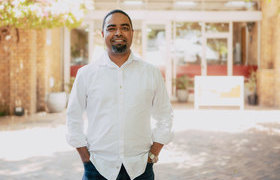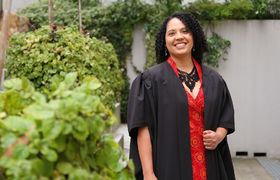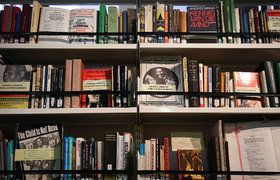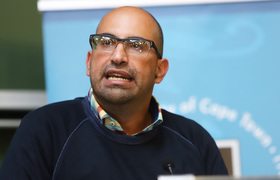Dialogue calls for renewed academic solidarity with Palestine
29 October 2025 | Story Stephen Langtry. Photos Lerato Maduna. Read time 5 min.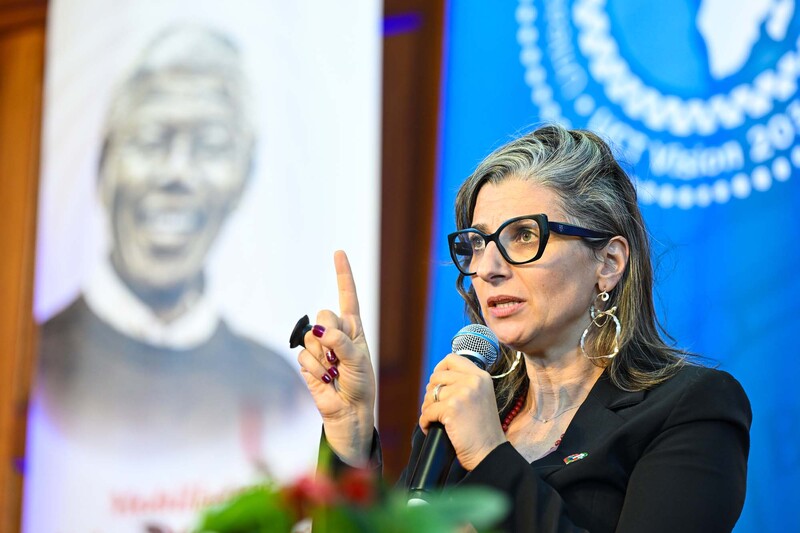
The Nelson Mandela School of Public Governance (NMSPG) at the University of Cape Town (UCT) hosted a public dialogue on Monday, 27 October 2025, under the theme “Liberation & the Academy: The Role of Universities in the Struggle for Palestine”.
Held in the Sarah Baartman Hall, the event drew academics, students, activists, and members of the public to examine how universities, corporations, and states can respond to what the United Nations (UN) special rapporteur on the Occupied Palestinian Territories, Francesca Albanese, described as “a genocide unfolding in Gaza”.
The dialogue took place a day before Albanese presented her latest report, Gaza Genocide: A Collective Crime, to the UN General Assembly via livestream from Cape Town. The report identifies 48 corporations and institutions linked to what Albanese terms a policy of “displacement and replacement”; a system that, she argues, has removed Palestinians from their land while enabling the expansion of Israeli settlements.
The evening opened with welcoming remarks from Dr Penny Parenzee of the NMSPG, who framed the dialogue as part of UCT’s ongoing engagement with issues of social justice and academic responsibility. “We hold this meeting on this campus, remembering that access to academic institutions and critiques of colonial knowledge systems were born out of struggles,” she said. “Academia has a fundamental role to play in how we understand the world and how we shape a more humane one.”
A call for accountability
Professor Suren Pillay, the director of UCT’s Centre for African Studies, moderated a panel discussion with Albanese; Professor Haider Eid, a South African-Palestinian academic and author affiliated with the University of Pretoria’s Centre for Asian Studies in Africa; Professor Nomusa Makhubu, the director of UCT’s Institute for the Creative Arts; and Professor Leslie London, the head of Public Health Medicine in UCT’s Faculty of Health Sciences.
Albanese outlined the legal and moral framework underpinning her latest report. She argued that the destruction seen in Gaza since October 2023 forms part of a decades-long process of domination. “There is not one business that comes to mind that is not involved,” Albanese told the audience. “Universities, research centres, banks, pension funds – many are complicit through their investments, their partnerships, and their silence.
“The crime is in the idea that some can take the land and remove the people. What we are witnessing today is not a new tragedy; it is the continuation of an old one.” Citing the legal definition of genocide, she pointed to forced displacement, “conditions of life calculated to bring about physical destruction”, and the targeting of cultural identity through the destruction of universities, libraries, and museums.
“When you erase institutions of learning and culture,” she said, “you attempt to erase a people’s identity.” Albanese emphasised that the duty to prevent genocide extends beyond the state accused of committing it. “Governments rarely act from morality,” she remarked. “It is people who push them there. Check what you buy … [the] political choices hidden in your basket.” She urged students and academics to scrutinise their own institutional and personal connections to global supply chains that sustain occupation and violence.
Academia, activism, and accountability
Professor Eid delivered a personal reflection on the devastation in Gaza’s education system. “We are not numbers,” he said. “More than 20 000 students and at least 1 700 teachers have been killed since last October. I have lost more than 50 cousins. I have lost my own family. I have no home to go back to.”
“When you erase institutions of learning and culture, you attempt to erase a people’s identity.”
He called on South Africa to match its symbolic solidarity with material action, questioning ongoing trade and security links with Israel. “Why are we still exporting coal? Why are we still enabling mercenaries?” he asked.
Albanese also drew attention to what she termed the “regression of academic freedom” in parts of North America and Europe, where universities have sought to limit Palestine-related speech and activism. “The university should remain a sanctuary for thinking,” she said. “Suppressing dissent is a method of control; it dictates not only what people say, but how they think.” Eid echoed her sentiment: “Education has become a target. The attempt to destroy schools and universities is an attempt to destroy the possibility of life itself.”
People’s Peace Prize
Dr Leigh-Ann Naidoo from UCT’s School of Education moderated a lively audience engagement session. The evening included a symbolic moment of recognition when Dr Fatima Hendricks and Basheera Soomar, South African participants in the Global Sumud Flotilla, presented the People’s Peace Prize to Albanese in honour of her steadfast advocacy for Palestinian human rights.
Albanese presented her report to the UN General Assembly on Tuesday, 28 October, livestreamed from the Desmond & Leah Tutu Legacy Foundation in Cape Town.
 This work is licensed under a Creative Commons Attribution-NoDerivatives 4.0 International License.
This work is licensed under a Creative Commons Attribution-NoDerivatives 4.0 International License.
Please view the republishing articles page for more information.
























